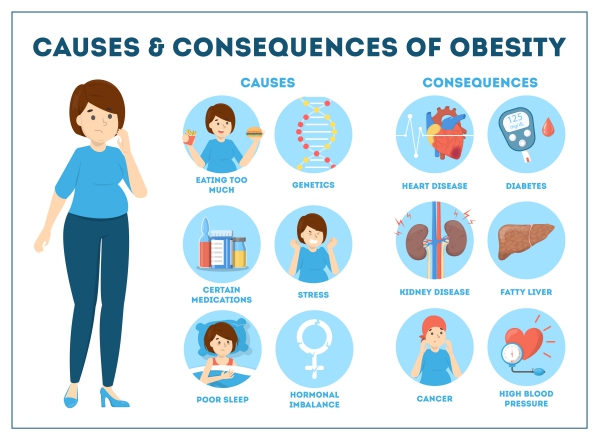What is obesity?
Obesity is a complex disease which involves an excessive amount of body fat and, unlike common beliefs, is not just limited to a cosmetic problem. It predisposes you to many other medical conditions like heart disease, high blood pressure and type 2 diabetes and is an issue which needs to be taken with serious consideration.
In the U.S, obesity is an epidemic. According to the Centre for Disease Control and Prevention (CDC), in 2017 to 2018, 42.4% of American citizens were clinically obese.
A body mass index (BMI) of 30 or more is defined as obesity. It is calculated using your weight in kilograms (Kg) and your height in metres (m). BMI continues to be widely used despite its limitations as it does not distinguish between excess body fat, bone or muscle mass.
What are the causes of obesity?
If you eat more calories than you burn daily, then this excess calorie is converted into fat which accumulates all around the body leading to obesity. You are likely to suffer from obesity if you:
- Eat a poor diet which is high in fats and calories
- Do not sleep enough
- Have a sedentary or inactive lifestyle
- Are at an older age which will make it easier to gain weight
- Are pregnant as the weight gained during pregnancy is usually more difficult to lose
- Have a genetic abnormality
- Drink too much of “liquid calories” such as alcohol and soft drinks
- Are taking medications such as steroids or birth control pills

There are several medical conditions that may also lead to obesity:
- Depression- this is because these people often turn to food as an emotional comfort
- Polycystic ovarian syndrome- this disease causes an imbalance of the female reproductive hormones
- Cushing syndrome- caused by an elevated cortisol level in the body
- Hypothyroidism- this is when the thyroid gland produces a reduced amount of hormones
- Medical conditions that produce pain upon movement such as osteoarthritis will promote inactivity.
Making a diagnosis
It is important for you to know how to calculate your body mass index. The body mass index (BMI) is calculated by dividing your weight in kilograms by the square of your height in metres. Your weight status can be divided into 4 categories according to your BMI:
| BMI (Kg/m²) | Weight status |
| < 18.5 | Underweight |
| 18.5 - 24.9 | Normal |
| 25.0 – 29.9 | Overweight |
| >30.0 | Obesity |
Your doctor may prescribe tests which will help to either diagnose obesity or rule out other diseases and these include:
- Cholesterol level
- Glucose level
- Liver function test
- Diabetes screen
- Thyroid test
Treatment of obesity
Lifestyle modification
The first step in the treatment of obesity is lifestyle modification. Regular physical exercises are advised (at least 300 min per week or try to go to the gym 2 to 3 times per week).
Cutting down sugar, starch and carbohydrate intake will reduce your hunger and you will eventually end up eating less. Therefore, your body will start burning stored fats for energy instead of carbohydrates.
In each of your meal, a protein, fat and low carbohydrate vegetable should be included. In addition, try to eat 3 meals per day. Eating plenty of protein will boost your caloric expenditure, reduce your food cravings and make you feel full. It is advised to eat a high protein breakfast every day. Healthy protein sources are meat (chicken, beef and lamb), fish & seafood, eggs and plant-based proteins such as beans, green peas and broccoli.

Low carbohydrate vegetables should also be an important component of your diet as it contains all the fibres, minerals and vitamins you need to be healthy. Some examples are broccoli, cauliflower, tomatoes and lettuce.
Last but not least, switching to healthy fats in your diet such as olive, avocado, coconut or canola oil can be helpful. However, trying to adopt a diet which is low in carbohydrates and fats at the same time can be very challenging.
Medical weight loss
In addition to lifestyle modifications, your doctor may prescribe some drugs to help you lose weight if ever the former did not work. These drugs either suppress appetite or prevent the absorption of fat. Some example of weight loss medications are orlistat (Xenical), liraglutide (Saxenda) and lorcaserin (Belvia). These medications may have some unwanted side effects such as frequent oily diarrhoea and gas (caused by orlistat).
Surgical weight loss or bariatric surgery
This method work by controlling the amount of food you can comfortably eat or by reducing the absorption capacity of food by your body. Some techniques may even do both.
Usually the acceptable candidates for bariatric surgery are those who have a BMI of greater than 40.0 Kg/m² or a BMI of 35.0 – 39.9 Kg/m² in addition to major obesity-related health issues.
The different surgical options available are listed below:

- Gastric bypass surgery- a small pouch is created at the top of the stomach which is connected directly to the small intestine thus bypassing most of the stomach
- Gastric sleeve- part of the stomach is removed
- Laparoscopic adjustable gastric banding- this technique separates the stomach into 2 sections and an adjustable band is place around the top part of the stomach
- Biliopancreatic diversion with duodenal switch- around 70% of the stomach is removed
Complications of obesity
Obesity can lead to various serious health issues, including:
- Type 2 diabetes: this is a disease which causes your blood sugar level to be above normal levels
- Heart disease and stroke: obesity causes your blood pressure and cholesterol level to be elevated which are major risk factors for heart disease and stroke
- Digestive problems: obesity increases the risk of developing liver diseases and indigestion
- Cancer: the risk of developing cancer is increased when you are obese (cancer of the cervix, uterus, breast, gallbladder, liver, rectum, ovary, pancreas, prostate and kidney)
- Sexual problems: obesity can cause erectile dysfunction in men
- Gynaecological problems: obesity can cause infertility and irregular menses in women
- Osteoarthritis: as the weight of an obese person is quite significant, the amount of pressure placed on the weight-bearing joints is increased. Hence, this increases the wear and tear of your joints causing osteoarthritis.
- Sleep apnoea: obesity is a major risk factor for sleep apnoea, in which your sleep is fragmented causing you to feel sleepy and tired all the time as you wake up unrefreshed.

Prevention of obesity
Several steps can be taken to prevent obesity if ever you are at risk of becoming obese, currently overweight or at a healthy weight. These are:
- Exercise regularly
- Follow a healthy-eating plan and stick to it
- Keep track of your weight regularly
- Keep a record of what you eat
Source:










